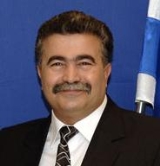
Amir Peretz
Overview
Israel
The State of Israel is a parliamentary republic located in the Middle East, along the eastern shore of the Mediterranean Sea...
i politician and member of the Knesset
Knesset
The Knesset is the unicameral legislature of Israel, located in Givat Ram, Jerusalem.-Role in Israeli Government :The legislative branch of the Israeli government, the Knesset passes all laws, elects the President and Prime Minister , approves the cabinet, and supervises the work of the government...
for the Labour Party. He is a former Defense Minister of Israel and former leader of the Labour Party, having left those positions in June 2007.
Peretz is the former chairman of the Histadrut
Histadrut
HaHistadrut HaKlalit shel HaOvdim B'Eretz Yisrael , known as the Histadrut, is Israel's organization of trade unions. Established in December 1920 during the British Mandate for Palestine, it became one of the most powerful institutions of the State of Israel.-History:The Histadrut was founded in...
trade union federation and defeated Shimon Peres
Shimon Peres
GCMG is the ninth President of the State of Israel. Peres served twice as the eighth Prime Minister of Israel and once as Interim Prime Minister, and has been a member of 12 cabinets in a political career spanning over 66 years...
in the primary election
Primary election
A primary election is an election in which party members or voters select candidates for a subsequent election. Primary elections are one means by which a political party nominates candidates for the next general election....
s for the Labour leadership on 9 November 2005. He led the Labour Party to a second place showing in the 2006 elections and became Defense Minister on 4 May 2006.
Quotations
The he:סיכול ממוקד|targeted assassination policy is a correct one. It is inconceivable that terrorists could operate freely without the ground quaking under their feet.![]()
Source: TV interview by Menashe Raz, Oded Shachar and Maya Bengal, on Channel 1, October 16, 2005
At the first stages of negotiations, we will not release prisoners with blood on their hands. However, as part of a final agreement, I do not rule out this option. Offering hope for a better future is more important than grieving the past.![]()
Source: TV interview by Menashe Raz, Oded Shachar and Maya Bengal, on Channel 1, October 16, 2005

